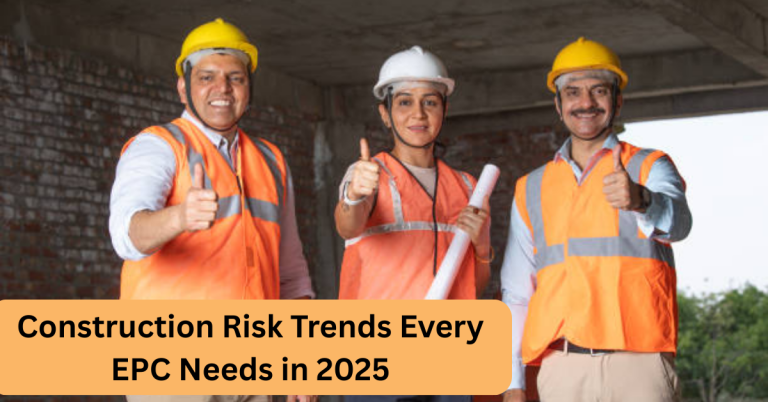As we progress into 2025, the Engineering, Procurement, and Construction (EPC) sector finds itself navigating increasingly complex risk environments. Evolving regulations, supply chain fragility, environmental considerations, and digital transformation are all contributing to a dynamic landscape. For building contractors in Chennai, staying competitive means not just executing projects efficiently but proactively identifying and managing emerging risks.
Today, risk isn’t confined to the construction phase it cuts across planning, procurement, design, and delivery. Let’s explore the top construction risk trends that every EPC firm should prepare for in 2025.
1. Stricter Compliance and Regulatory Oversight
Government bodies across the globe are reinforcing compliance frameworks, with added focus on environmental impact, labor welfare, and safety measures. Contractors are now under more pressure to document every aspect of their work, including sustainability metrics and waste management records.
In cities like Chennai, builders must manage a multi-layered regulatory setup, balancing municipal construction codes, environmental clearances, and new digital documentation requirements. This has made it essential for EPC teams to integrate legal advisors and compliance software into their workflows from day one.
2. Supply Chain Disruptions Remain Persistent
Geopolitical instability, transportation constraints, and material shortages are contributing to highly volatile supply chains in 2025. Projects that rely heavily on imported materials or international vendors are particularly vulnerable.
To counteract this, EPC firms are decentralising sourcing strategies and embracing vendor management tools to ensure alternatives are available. Additionally, many projects are turning to pre-engineered buildings and modular construction techniques, which reduce site-time but demand a more reliable backend.
3. Skilled Labor Shortage and Workforce Risks
Despite technological advancements, much of the construction process still relies on human expertise. The shortage of trained workers has grown into a global issue, affecting timelines and quality assurance.
In India, particularly for building contractors in Chennai, this challenge is pronounced due to the high pace of development. Contractors are increasing investment in skill development programs, implementing multilingual safety protocols, and offering better on-site facilities to retain labor and improve productivity.
4. Rising Costs and Financial Volatility
Inflationary pressures continue to influence construction budgets, from fuel costs to raw materials. The gap between projected and actual costs often leads to disputes, strained margins, and re-evaluation of payment terms.
To mitigate financial risk, many EPC firms are adopting predictive budgeting tools and cost-control dashboards. Flexible contract structures like escalation clauses and milestone-based disbursements are gaining popularity to absorb unexpected cost spikes.
5. Sustainability as a Risk Metric
Sustainability is no longer viewed solely as a value-add but as a compliance requirement. From green building certifications to mandates on energy use and waste reduction, contractors face mounting pressure to deliver environmentally responsible outcomes.
Clients and governments alike are holding contractors accountable for long-term environmental impact. In response, companies are embedding carbon footprint calculators, life cycle assessments, and low-emission technologies into their standard project frameworks.
6. Digital Threats and Cybersecurity Risks
With EPC projects relying on digital tools for design, scheduling, and procurement, cybersecurity has emerged as a major risk area. A breach in a construction management platform or BIM system can cause data loss, project delays, or even manipulation of structural data.
EPC contractors are increasingly turning to encrypted systems, firewalls, and cloud-based redundancy solutions to secure sensitive project data. Training employees to recognize phishing threats and follow secure communication protocols has also become a priority.
7. Quality Risks in Turnkey Projects
As more EPC contracts move toward turnkey models, the need for end-to-end quality assurance is intensifying. With full control over design, procurement, and execution, the onus of quality is entirely on the contractor.
This makes it essential to embed quality benchmarks across every phase. In fact, recent insights on managing risk through quality measures highlight the value of aligning compliance checks with execution timelines particularly when turnkey delivery methods are involved. Firms that adopt this integrated approach to risk and compliance are better equipped to handle the rigorous demands of modern infrastructure projects. For deeper perspective, the article on ensuring quality compliance in turnkey projects outlines essential practices that reduce long-term risk exposure.
8. Climate Change and Extreme Weather Events
The construction calendar is becoming more unpredictable due to frequent climate disruptions. Sudden monsoons, cyclones, and extreme heat waves can halt operations and affect safety.
Chennai and other coastal cities are especially vulnerable to these events. Contractors are investing in flexible schedules, weather-resistant materials, and contingency buffers to handle delays without compromising on project delivery.
9. Stakeholder Misalignment and Communication Gaps
Poor communication between clients, consultants, contractors, and vendors can lead to rework, scope creep, or legal disputes. In 2025, stakeholder risk is managed through centralized communication tools and digital collaboration platforms.
Defining roles clearly, maintaining version control of project documents, and holding regular review sessions have proven effective in keeping everyone aligned throughout the EPC lifecycle.
10. Legal and Reputational Risk Management
The interconnected nature of modern construction means that one misstep such as a delay in approvals, labor violations, or land disputes can trigger both legal and reputational challenges.
EPC contractors are increasingly employing legal counsel during feasibility studies and actively engaging with local communities before breaking ground. Social licenses, ethical conduct, and transparency now play a vital role in protecting long-term credibility.
The Road Ahead: Proactive Risk Intelligence
Construction risk management is no longer a defensive function—it’s a proactive strategy that defines project success in 2025. By adopting intelligent systems, transparent frameworks, and forward-looking policies, EPC firms can turn uncertainty into opportunity.
For building contractors in Chennai, the message is clear: adapt quickly, embrace innovation, and embed risk thinking into every layer of project development. Staying informed of current risk trends, investing in compliance intelligence, and ensuring strong stakeholder relationships are no longer optional; they’re essential practices for EPC leadership in a rapidly evolving world.

